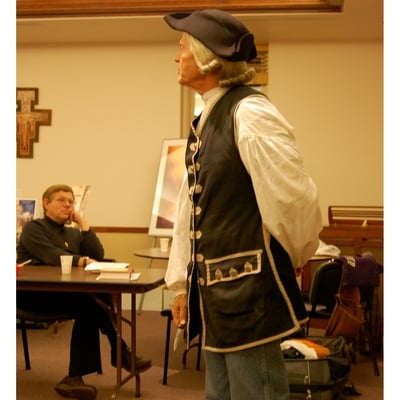I used to have a
colleague at Asbury who said that when he was a teenager he came to the altar
in repentance so many times, and was born again so many times, he had stretch
marks on his soul! Whatever else you
say about the new birth, if it is genuinely the new birth, it only happens once
to a person, at the beginning of his or her Christ life. It does not happen again and again and
again. You can no more be ‘a little bit
born again’ than you can be ‘a little bit born’ in the first place.
Near
the beginning of his sermon on the ‘Marks of the New Birth’ John Wesley makes
unequivocally clear that conversion is a work of God. Quoting John 1.12-13, he says “we
must “become the sons of God, …believe on his name; [becoming sons] which were
born,” when they believed, “not of blood, nor of the will of the
flesh,” not by natural generation, “nor of the will of man,”
like those children adopted by men, in whom no inward change is thereby
wrought, “but of God.”
Wesley thus stresses that the inward change that happens to a person
that makes them a believer happens through the work of God not through human
will. God is the agent of initial
spiritual formation which we call conversion or the new birth, we are not. God in the person of the Holy Spirit is also
the primary ongoing agent of spiritual formation, we are not. It’s a matter of our co-operating with what
God is already doing in the body of Christ, and in us as individuals as
well. In fact, as much as anything, it
has to do with our getting out of the way
of the Holy Spirit, ceasing to quench or grieve the Spirit in our lives,
but rather opening ourselves up to the Spirit’s renovating, gifting, character
forming powers.
When Wesley talks
about our getting out of the way of the work of God in our lives, he even calls
it ‘a renouncing of self’. Too many
times, modern spiritual formation literature, with its indebtedness to modern
psychology, presents spiritual formation as a series of things we can do to
improve our sense of self-worth as a Christian, or it presupposes the
importance of having a healthy sense of self and self-importance in order to
grow in Christ. While I would not want
to say this is 100% wrong, I would say it is mostly wrong. Here
is how Wesley describes things:
“The
true, living, Christian faith, which whosoever hath, is born of God, is not
only an assent, an act of the understanding; but a disposition, which God hath
wrought in his heart; “a sure trust and confidence in God, that, through
the merits of Christ, his sins are forgiven, and he reconciled to the favour of
God.” This implies, that a man first renounce himself; that, in order to
be “found in Christ,” to be accepted through him, he totally rejects
all “confidence in the flesh;” that, “having nothing to
pay,” having no trust in his own works or righteousness of any kind, he
comes to God as a lost, miserable, self-destroyed, self-condemned, undone,
helpless sinner; as one whose mouth is utterly stopped, and who is altogether
“guilty before God.” Such a sense of sin, (commonly called despair,
by those who speak evil of the things they know not,) together with a full
conviction, such as no words can express, that of Christ only cometh our
salvation, and an earnest desire of that salvation, must precede a living
faith, a trust in Him, who “for us paid our ransom by his death, and
fulfilled the law of his life.” This faith then, whereby we are born of
God, is “not only a belief of all the articles of our faith, but also a
true confidence of the mercy of God, through our Lord Jesus Christ.”
As usual, Wesley does not mince words. Spiritual formation exercises without
repentance of sin availeth not, says our spiritual forebear. That deep trust in God that a true believer
has is something wrought in the inner life of the believer by God himself in
the person of his Spirit. In order to be
‘found in Christ’ we have to first ‘renounce ourselves’. Notice that Wesley
does not say we must renounce or give up some
things, like giving up chocolate for Lent!
No, it is ‘ourselves’ that we
must renounce. Jesus of course says the
same thing— ‘if anyone would come after me they must deny themselves (not
merely deny themselves something) take
up their own crosses and follow me.’
The beginning of spiritual formation comes with a clear sense of our own
sin and guilt before God. Too little
spiritual formation even talks about sin and the way it gets in the way of
being conformed to the image of Christ, but think about it for a moment. Christ was the sinless one. Wouldn’t spiritual formation that has the aim
of Christ-likeness have as one of its major tasks dealing with sin in the life
of the believer? We have come to such
a sorry place in American culture, that we think we can be ‘spiritual’ without
being repentant of our sins, reconciled to God, and on the path of conformity
to the image of Christ. Indeed, bumper
stickers are popping up everywhere which say things like “I’m spiritual, not
religious”.
Of course part of the problem in America these days is
that we have ceased to be an honor and shame culture, and even the church has in too many cases
become part of the ‘feel good’ self-actualizing culture. I never will forget the shock of sitting on
the platform in the Crystal cathedral next to Dr. Schuller with the choir
singing that great Isaac Watts tune ‘When I Survey the Wondrous Cross’ when to
my dismay Schuller handed me his bulletin where he had underlined the hymn
phrase ‘and pour contempt on all my pride’ and next to the word ‘pride’ he had
written NO! and beside that he wrote,
‘pride in self is a good thing’. Mr.
Wesley thought otherwise. When a culture
loses its sense of sin and shame, it loses its understanding of true honor and
salvation.
In that wonderful movie, ‘Amazing Grace’ about William Wilberforce and his mentor John
Newton, there is a very powerful scene where these two men are meeting and
discussing vital things, and Newton then says ‘These two things I know. That I
am a great sinner, and that Christ is a great savior.” Here was a man who knew the need for
repentance, full whole-hearted repentance, for he had once been a captain of a
slave ship and had been party to the enslaving of hundreds and hundreds of
Africans. When Christ invaded his life,
he not only became a minister of Christ, he spent much of the rest of his life
repenting of his many sins. Those who do
not have a strong sense of sin and guilt, hardly understand the need for the
mercy of God, hardly grasp that salvation is not a self-help or spiritual tune
up program, it is a radical rescue which must involve our denying ourselves or
as Wesley puts it ‘renouncing ourselves’.
What happens to the new convert when the spiritual
formation of conversion invades a person’s life? What is the first spiritual fruit of the
Spirit changing us? Wesley has no doubt
about what it is—
An immediate and constant fruit of
this faith whereby we are born of God, a fruit which can in no wise be
separated from it, no, not for an hour, is power over sin; — power over
outward sin of every kind; over every evil word and work; for wheresoever the
blood of Christ is thus applied, it “purgeth the conscience from dead
works;” — and over inward sin; for it purifieth the heart from every
unholy desire and temper. This fruit of faith St. Paul has largely described,
in the sixth chapter of his Epistle to the Romans. “How shall we,”
saith he, “who” by faith “are dead to sin, live any longer therein”
“Our old man is crucified with Christ, that the body of sin might be
destroyed, that henceforth we should not serve sin.” — “Likewise,
reckon ye yourselves to be dead unto sin, but alive unto God, through Jesus
Christ our Lord. Let not sin therefore reign” even “in your mortal
body,” “but yield yourselves unto God, as those that are alive from
the dead.” “For sin shall not have dominion over you. — God be
thanked, that ye were the servants of sin, — but being made free,” — the
plain meaning is, God be thanked that though ye were, in time past, the
servants of sin, yet now — “being free from sin, ye are become the
servants of righteousness.”
The first great effect of spiritually being changed is
power over sin, both inward and outward sin.
The old self has been crucified, and is buried with Christ in baptism
(Rom. 6), behold the new has come to past.
One of the real differences between spiritual formation discussions in
the Wesleyan Way and some other Protestant discussions of spiritual formation
is that Wesleyans do not believe
Christians are still in the bondage to sin.
They believe that the Spirit has set us free from the principle of sin
and death (Rom. 8.1-2). For freedom
Christ has set us free, so we need no longer dwell in the past.
John
Wesley was quite convinced that we must take 1 John 3.9 in complete
earnestness. ‘Whoever is born of God does not sin’. Wesley cautions in this self-same
sermon on the New Birth, that that text should not be amended by adding the
term ‘habitually’ as if it read ‘Whoever is born of God doesn’t sin with
regularity’. Wesley however defines sin
more narrowly than in some places in Scripture.
Wesley means conscious willful sin whether inward or outward sin. He does not mean sins of omissions, or
accidental sins, and the like. His point
is that we have power over conscious willful sin, and can avoid it by the power
of the Spirit.
Wesley
believes that what begins to happen at conversion is that the peace, hope, and
love of God begins to fill the human heart. Not only does a person gain confidence that he
or she is a child of God, in addition to that settled confidence comes a sense
that one is at peace with God as well and so one has hope for the future, and
one is able to love God and one’s neighbor and one has the joy of the Spirit. The spiritual formation of the fruit of the
Spirit is what we must turn to in the next chapter. But here there is still more to mine from
this sermon of benefit to our study.
Wesley notes that in that great chapter in Romans, Rom. 8, which is
filled with the discussion of the Spirit, one of the things that happens when
the Spirit enters the believer’s life is it enables and empowers their prayer
life and of course prayer is one of the main disciplines discussed in modern
spiritual formation literature.
“Ye have received the Spirit of Adoption,
whereby we cry, Abba, Father!” Ye, as many as are the sons of God, have, in
virtue of your sonship, received that selfsame Spirit of Adoption, whereby we
cry, Abba, Father: We, the Apostles, Prophets, Teachers, (for so the word may
not improperly be understood,) we, through whom you have believed, the
“ministers of Christ, and stewards of the mysteries of God.” As we
and you have one Lord, so we have one Spirit: As we have one faith, so we have
one hope also. We and you are sealed with one “Spirit of promise,”
the earnest of your and of our inheritance: The same Spirit bearing witness
with your and with our spirit, “that we are the children of God.”
(Rom. 8:14-16).
So
close is the connection between the activity of the Spirit in the believer and
the activity and response of the believer to God, that Paul says here it is the
Spirit by which we cry Abba Father. That is, we can’t even say the Lord’s
prayer, and mean it, without the prompting and empowering internal work of the
Spirit. We are dependent on the Spirit
not just for our character formation, but for the unction to function as one
who boldly address God as Abba.
What
we have seen in this essay is that the root of spiritual formation, the
beginning of that process, comes at conversion, and that the Spirit provides us
with all that is necessary not just to begin that process, but to continue it,
even when it comes to overcoming sinful inclinations and even when it comes to
prayer. We have stressed in this chapter
and the last as strongly as we could that salvation is into a body of
believers, that once we are born again, we are baptized by the Spirit into the
body of Christ. Spiritual formation in
the primary sense happens in that way and in that context. And we also stressed that conversion is not
primarily about Jesus being incorporated into our lives as ‘our personal Jesus’
but rather about our being incorporated in to Christ, becoming ‘in Christ’ becoming a part of a living organism, not an
organization. And that organism is called the body of Christ. We will explore more about how the Spirit
shapes our spiritual character in the next chapter. But here let us leave this discussion with a
word of encouragement.
The
normal Christian life is a busy life— busy with family, work, children, rest,
even play. It involves all sorts of
activities all of which should be done to the glory of God and for our
edification. If that is our orientation,
then all that we do and refrain from doing can be part of our spiritual
formation. But more than that, we do not have to do our
spiritual formation alone. For one thing, God is already at work in us to
will and to do. For another thing we
have been joined to a body of believers by God’s Spirit and they are all on the
same pilgrimage. Spiritual formation is chiefly part of body life, part of
things we do together. We should not be
putting ourselves on a guilt trip if we don’t have time to spend hours and days
on a weekly basis doing certain kinds of supererogatory spiritual formation
practices like fasting, or praying all night, or endlessly journaling, or the
like. The good news is, the Spirit
never sleeps and is at work in us all
the time and the Spirit is the primary agent of our spiritual formation we are not., In any case, what we do together with our
fellow Christians is already the main
means of our spiritual formation.
Everything else should be seen as a supplement to, not as supplanting,
our life in the body of Christ.


